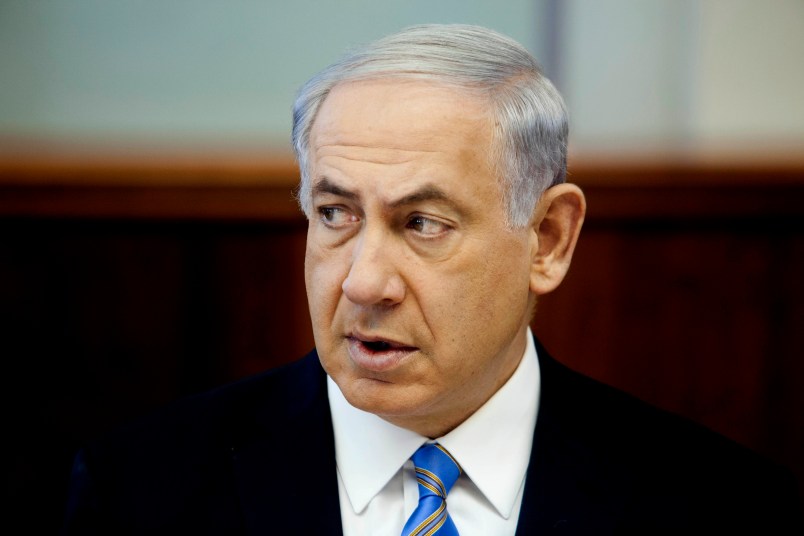I had meant to write this post Monday or Tuesday. But odds and ends and a business trip got in the way. As it happens, another twenty-four hours has only increased the signs that, with less than a week to go before the Israeli elections, Netanyahu is slipping and perhaps in real danger of being ousted as Prime Minister.
As we noted last week, the initial polls after the Prime Minister’s speech to Congress painted an equivocal picture: perhaps a very small bump of support but one that seemed to subside quickly and still leave the Zionist Camp/Labor Party with the slenderest of leads. But over the weekend something changed.
Over the last three days a new raft of polls has been published which show ZC/Labor with a lead of between two and four seats over Likud. That is at the very outer range of the leads ZC/Labor has had. But the trend has not been this pronounced in the past or with a group of polls all seeming to agree on the same movement. What’s more, Likud’s numbers clearly seem to be dropping in absolute terms. There have also been press reports — supported by my own reporting — that internal polls from the two major parties show a bigger gap than the public polls.
There are also signs of erosion, though still limited, for the entire center-right bloc — not just Likud, but the allied parties from which it would build a natural coalition.
So what happened?
It may simply be the heightened and not uncommon volatility that comes in the last days of an election when the mass of voters begun to really focus on the decision. Or it may be a rapid string of events coming at once undermining Netanyahu’s credibility on his signature issue: security. J.J. Goldberg runs through three of them here. In short, a smashing critique of his rule by a former chief of the Israeli foreign intelligence service, Mossad; a botched commercial which some core Likud supporters believed was comparing them to Hamas; and then a leaked document about negotiations with the Palestinians.
The last is the most interesting. A document surfaced purporting to show that Netanyahu had discussed a far-reaching settlement with the Palestinians which would approach the kind of deal real two-staters endorse — something far more than he has ever suggested a willingness to consider publicly. First his campaign denied its authenticity, then it denied its implications. Then his campaign took back his original endorsement (albeit an extremely hedged one) of the two-state principle. Then it un-took it back. Kind of.
The whole drama allowed core supporters on the right to think he might have been willing to contemplate or even suggest what it is his party’s raison d’etre to oppose and then centrist voters to see (conclusively) that in fact he is closing off any future possibility of a settlement with Palestinians on any terms. The whole flurry looked panicked and desperate, and in recent days he and his campaign and top supporters have moved on to an escalating series of claims about how unknown forces in America or worldwide are banding together with the press in Israel to topple him.
Netanyahu is now openly saying that if things continue as they are, Herzog will be the next Prime Minister.
Of course, that is in large part to scare right-wing voters into showing up at the polls and not just voting, but voting for his party and not the smaller right-wing parties. He needs those votes for himself and not ideological allies so that he can jump back in front of Herzog. But a mix of polling, reporting from within Likud and the currently frantic nature of Netanyahu’s campaign leave little doubt that they are generally afraid Netanyahu is about to be ousted as Prime Minister.
Let me do the usual caveats. Starting today analysts in the Israeli press have started referring to Herzog’s position as his first solid lead in the campaign. The public polls at least still show it in the low to mid-single digits. And on top of that, there is still the very real problem of how Herzog would assemble a coalition. First, there is the problem which I discussed earlier of the likely non-inclusion of a dozen or more seats from the Joint Arab List. But on top of that, Herzog would likely need to find a way to bring a secular party (which is hostile to the special accommodations of the ultra-Orthodox) together with one of the ultra-Orthodox parties, and/or a viciously nationalistic party like Avigdor Lieberman’s Yisrael Beytenu with the left-wing Meretz or even an Arab party, both of which would be very challenging.
But in recent days, the numbers have shifted enough that there are a handful of ways Herzog could plausibly pull that off — with at least some members of the Arab Joint List supporting the government from outside the coalition. Here’s a piece from this morning which explains why, if Likud’s numbers stabilize now, Netanyahu still has the upper hand in eventually forming the next governing coalition. But as the piece also notes, all the remaining unknowns seem to favor Herzog and his Zionist Camp/Labor Party.
Likud and Netanyahu are right to be panicked. But if the party can stabilize his numbers, he still has many natural advantages.






